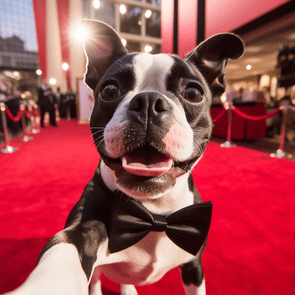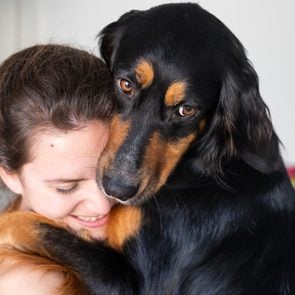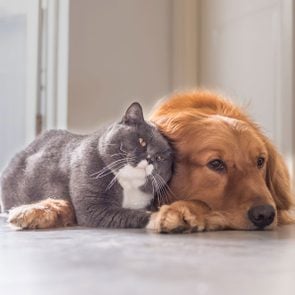Why Do Dogs Sniff Butts? Pet Experts Explain This Bizarre Canine Behavior
Updated: Oct. 30, 2023
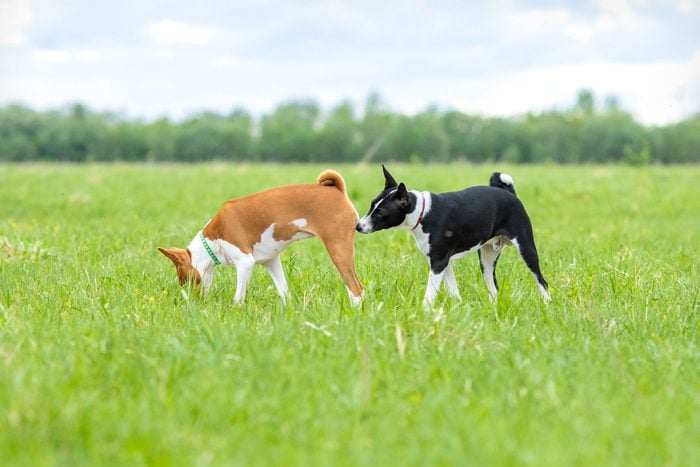
It may be awkward, but that gross butt-sniffing habit is not as weird as you think
We love our dogs for all the love, affection and emotional support they freely give. Still, some of their quirks and odd dog behavior are downright embarrassing, especially when you have to explain why dogs hump or why dogs sniff your crotch to your bewildered friends and family. And if that wasn’t awkward enough, there’s one more question to answer: Why do dogs sniff butts?
We’ve all been there: You’re out for a walk or playtime at the dog park when your doggo meets another pooch, and instead of shaking paws—which would be really cool—they sniff each other’s butts. Even though dog parents expect this, it’s still kind of embarrassing. But there’s nothing quite as cringeworthy as when a dog takes it to the next level and takes a whiff of a human’s butt.
So why exactly do dogs do this—and what can you do to curb the behavior? We talked to a veterinarian and canine behavior expert to find out.
Get Reader’s Digest’s Read Up newsletter for more pets, humor, cleaning, travel, tech and fun facts all week long.
How strong is a dog’s sense of smell?
Dogs have an extraordinary olfactory capability, befitting a superpower. So much so that their sense of smell reigns as their primary sense. Because of sheer biology, dogs primarily use their sense of smell rather than sight. Dogs have roughly 300 million scent receptors compared with our measly 6 million, and the smell-analyzing compartment of their brain is about 50 times greater than that of humans. According to a review in Frontiers of Veterinary Medicine, their smell receptors are so powerful that they can pick up substances at concentrations of one part per trillion—that equates to a single drop of liquid in 20 Olympic-size swimming pools!
How do dogs use their sense of smell?
Long ago, humans discovered dogs could smell things humans can’t and utilized dogs’ keen sense of smell for hunting, tracking and detecting bombs, drugs and human diseases. But how do dogs use their sniffers for themselves, and why do dogs sniff butts, of all things? “Dogs smell their way through life for two main reasons—enjoyment and information gathering to learn more about something or someone,” says Terrence Fergusen, DVM, veterinarian at Critter Fixer Veterinary Hospital in Bonaire, Georgia, and co-host of Critter Fixers: Country Vets on National Geographic.
Basically, their nose is what the eyes are for us. We use our sight to interpret what we see, and dogs use their sense of smell to perform the same role. Amazingly, they also have a keen scent memory. “Dogs can also remember scents and therefore determine whether they have met another dog before,” says Dr. Fergusen.
Of course, they also use their cute noses for other basic necessities, such as finding mama’s milk when they are newborn puppies, discovering treats in a doggy puzzle, finding a good place to go poop and communicating with humans. “Most animals and humans have their own unique smells, and depending upon what [dogs] smell, it will dictate how they interact with them,” says Dr. Fergusen. “As dogs and humans spend time together, they can learn communications unique to their pair/group and then form bonds with specific individuals.”
For instance, humans have distinct odors that give dogs a snapshot of how we’re feeling physically and mentally. When we’re anxious, dogs can detect body chemicals on our skin that surface thanks to an increased heart rate and blood flow. They can tell if we are happy or cranky. And they smell adrenaline when we’re stressed or scared. Some dogs can even sniff out cancer.
Why do dogs sniff other dogs’ butts?
In a nutshell, it’s a dog’s way of greeting and asking, “Have we met?” Yet, as odd and embarrassing as it is to watch, it’s a totally natural doggy behavior. “For dogs, each rear end is potentially communicating some specific information about the dog in the scents coming from the anal glands inside the dog’s rectum,” says Rachel Salant, animal behavior specialist with Veterinarians.org.
The anal sacs produce chemical compounds, such as trimethylamine and a set of short-chain acids, which send out a sharp and powerful odor. So when your dog sniffs another dog’s butt (or smells another dog’s pee on a tree), a chemical communication system is activated, courtesy of an organ called Jacobson’s organ. It’s located inside the nasal cavity and opens into the roof of the mouth with a direct line to the brain. Even more fascinating is that there’s no interference from competing odors along the way, so all it takes is a few whiffs to give the other dog the once-over, and vice versa.
The amount of data a dog intakes is staggering, and the type of information is downright personal. “Scents in this area can tell another dog about gender, reproductive status, diet, health status, temperament, stress and much more,” says Dr. Fergusen.
Why do dogs sniff human butts?
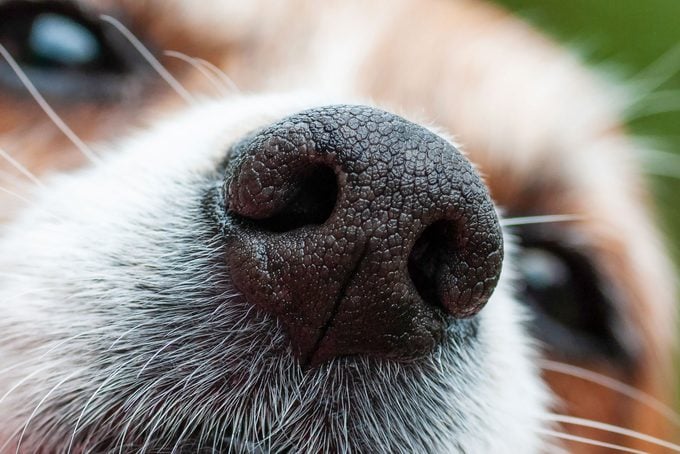
Now that you know how to respond to someone who asks why do dogs sniff butts, you might wonder if dogs smell human butts for the same reason. Probably. Some dogs interact with humans as they would another dog, and since they use their noses to explore everything and everyone in their world, sniffing human butts might be the venue of choice to seek out general information and reveal secrets about you.
“Humans have unique scents coming from this area of the body, so many dogs will try to find out more about a person by sniffing their butt,” says Dr. Fergusen. Sweat glands in the groin region impart stats such as age, sex, mood, health issues and more, depending on what’s happening in the human body. “Dogs will sniff more frequently with people whose bodies express complex smells.” Those complex smells are the pheromones and hormones from menstruation, intercourse, pregnancy and nursing moms who recently gave birth.
Should you let your dogs sniff butts?
If the dogs involved in the sniffing (the one doing the sniffing and the one being sniffed) are well-socialized and know how to appropriately act around other dogs, “it’s OK to let your dog participate in this kind of greeting,” says Salant.
However, butt sniffing isn’t always appreciated by some dogs. When two dogs meet up, it is important to keep a close eye on their facial expressions and the signals their tail is telling you. A dog may snarl or growl or move away from the other dog. If one dog is uber excited to sniff a new dog’s butt or one is uncomfortable, it’s best to part ways to keep everyone safe and happy.
How can you get a dog to stop sniffing a human’s butt?
While sniffing is a huge part of everyday life for a dog, sniffing human butts is embarrassing and uncomfortable, especially if your dog sniffs a new friend’s butt or guests’ butts when they visit.
“While you may not be able to completely get rid of that behavior, you can try to gently redirect it to something you deem more appropriate. For example, you can offer your hand in greeting as the body part to sniff,” says Salant. You can also train your dog to sit whenever anyone new approaches or comes into your house. When they sit, reward the behavior with high-value dog treats.
Why does my dog sniff its own butt?
It should be easy to grasp why dogs sniff butts, but why in the world would they need to sniff their own butt? “Again, their sense of smell is so good that they may be getting information about themselves from their own anal gland scents,” says Salant.
If they’re just sniffing and seem otherwise normal, it’s OK to let them sniff. You might notice they sniff and lick their rears after they pass gas or get home from the groomers. However, if you see other signs, such as scooting their butt on the floor or biting and licking their butt and tail, your dog may be asking you for help. They could be itchy or in pain from skin irritations, a blocked anal sac, fleas, worms or allergies. If that’s the case, call your veterinarian for treatment.
About the experts
- Terrence Fergusen, DVM, is a Tuskegee School of Veterinary Medicine graduate and a veterinarian at Critter Fixer Veterinary Hospital in Bonaire, Georgia. He’s the co-star of Critter Fixers: Country Vets, a National Geographic and Disney+ TV show that chronicles his veterinary life. When he’s not fixing up animals of all shapes and sizes, he enjoys spending time with his family, including miniature schnauzers Chloe and Bailee, and volunteers and mentors students at the Peach County Youth Organization.
- Rachel Salant is an animal behavior specialist with Veterinarians.org, currently based in Seattle, Washington. Salant specializes in behavior modification using the most positive and least intrusive techniques. She is passionate about helping pet parents navigate the often confusing and conflicting information about pet behavior. In her spare time, she works with a local rescue specializing in giving geriatric/non-adoptable dogs comfortable hospice homes. She also enjoys hiking with her husband and dog, Diego.
Sources:
- Understanding Animal Research: “The science of sniffs: disease smelling dogs”
- Frontiers in Veterinary Science: “Canine Detection of the Volatilome: A Review of Implications for Pathogen and Disease Detection”

